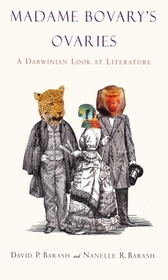Ben R. (benrob22) reviewed Madame Bovary's Ovaries: A Darwinian Look at Literature on + 30 more book reviews
There are not many books where I felt relief when finishing...this is one of them. Very odd premise looking at literature for bioligical intent and support of biological theories. With the broad expanse of literature to choose from, it is easy to cherrypick stories, characters and plots to support or debunk any theory. The authors do this throughout the book often at times contradicting themselves...altruism, parenthood, evil stepparents, and relationships. Some references are from well known works while others are less well known so are a bit of a reach. I am not sure I woudl include Rebecca Wells as literature, just my thought. I find it odd also, the authors reference the movie The Godfather but do not seem to reference the book. Like I said, odd for a book on literature.
A positive note, both authors love their literature and that love does shine through at points. You may find yourself loooking to find a copy of Madame Bovary or some Faulkner after reading this.
A positive note, both authors love their literature and that love does shine through at points. You may find yourself loooking to find a copy of Madame Bovary or some Faulkner after reading this.
As one might expect from the title, this book takes a light-hearted look at the way in which biological imperatives drive the characterization and plot of many pieces of classic literature.
Briefly put, that biological imperative is to send one's genes into the future, and to do so by choosing the partner best equipped to get them there. Pretty straightforward and Darwinian, if not overly romantic.
The authors try valiantly to expand this simple concept to fill 358 pages, and as one might expect, it gets a little iffy at times. They do fine when making the notion of "biologic fitness" comprehensible, and choose interesting (if sometimes obvious) pieces of literature to demonstrate what that means to fictional characters.
But the whole thing falls apart when they get beyond traditional parenting and wander off into the biological basis for altruism in non-related subjects and the notion of "selected kinship", in which individuals from another genetic line are offered the social/cultural amenities normally reserved for offspring or potential mates.
By the time they get to the subject of adoption and beyond that to non-sexual buddy literature ('Three Musketeers', anyone?) the whole biological imperative thing seems to be left in the dust. Same-sex relationships don't even get a passing glance.
As pop science goes, it's an entertaining read, but it will hardly revolutionize one's view of Madame Bovary -- or any of the other literary creations it attempts to shoehorn into the premise.
Briefly put, that biological imperative is to send one's genes into the future, and to do so by choosing the partner best equipped to get them there. Pretty straightforward and Darwinian, if not overly romantic.
The authors try valiantly to expand this simple concept to fill 358 pages, and as one might expect, it gets a little iffy at times. They do fine when making the notion of "biologic fitness" comprehensible, and choose interesting (if sometimes obvious) pieces of literature to demonstrate what that means to fictional characters.
But the whole thing falls apart when they get beyond traditional parenting and wander off into the biological basis for altruism in non-related subjects and the notion of "selected kinship", in which individuals from another genetic line are offered the social/cultural amenities normally reserved for offspring or potential mates.
By the time they get to the subject of adoption and beyond that to non-sexual buddy literature ('Three Musketeers', anyone?) the whole biological imperative thing seems to be left in the dust. Same-sex relationships don't even get a passing glance.
As pop science goes, it's an entertaining read, but it will hardly revolutionize one's view of Madame Bovary -- or any of the other literary creations it attempts to shoehorn into the premise.
One can only imagine the kitchen table conversations that inspired evolutionary psychologist David Barash and his daughter Nanelle (an undergraduate at Swarthmore) to collaborate on this witty and insightful book. Their explicit goal is to apply the basic principles of sociobiology (think Richard Dawkins's The Selfish Gene) to the study of literature. Thus, they say, we can better understand Othello as "a story about a jealous guy" if we know that males tend to be particularly afraid that their mate might have been impregnated by another, thus suckering them into expending resources on a child who doesn't carry their genes. By the same token, we can read Jane Austen's novels as detailed depictions of the cost-benefit analysis inherent in female mate selection. This conceit actually works quite nicelythe Barashes' writing is easy and ironic, as if they themselves take it with a grain of salt, and sociobiology benefits from being cast as an interpretive lens rather than the ironclad, coldly calculated truth that leaves many of its opponents feeling nervous about being nothing more than "gene machines." From its irreverent title to the last paragraph, the result is a surprisingly lighthearted romp through both literature and the animal kingdom, aimed at a casual reader who's interested in either or both.
A Darwinian look at several literary classics. Perceptive and often quite funny.




